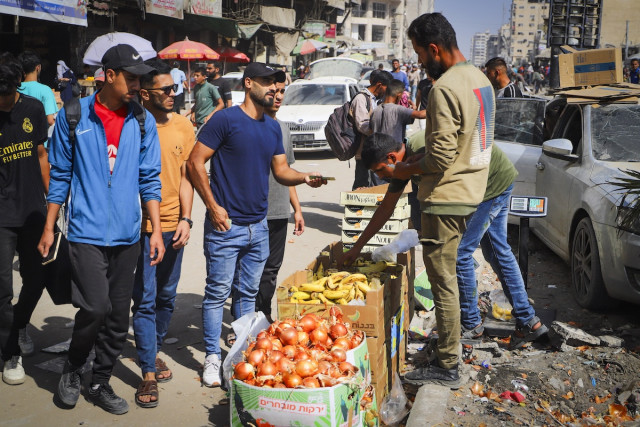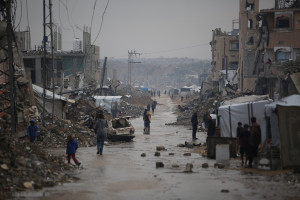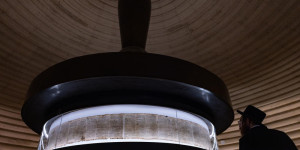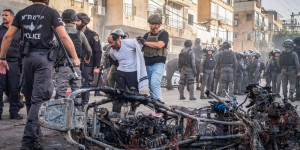An inside look at what’s going on in Gaza – Part 2

From a strategic point of view, Hamas is doing what they have to do to survive. Israel has successfully taken over the areas of Rafah and Khan Yunis without demanding the official act of a Hamas surrender. For Hamas, they view it as a “transferring of areas” without admitting defeat.
But for local Gazans, all they can see is that those who remain of their government are nothing more than “bullies and thugs,” who do not resemble a legitimate regime.
This causes them to ask, “Where’s the security we were promised? What kind of safety is there if Hamas is shooting at their own people? Why would anyone want to stay in Gaza.”
One man pointed to the inside of his home saying, “I live in a wooden tent, covered with strips of material. How long can I last like this? Everyone is waiting for passageways to open up now that there is a ceasefire. I promise you that once they do, there will be a flood of people going out. No one will stay here. You can be sure that half of the residents of Gaza will migrate if given the chance. The present living conditions are unworkable.”
What, perhaps, shouldn’t have come as a surprise, is the fact that only one month after the ceasefire, Hamas has returned, despite the heavy blows it took from an unrelenting IDF. Today, Hamas has exclusive control over all public civilian services as well as the municipality.
Another Gazan who didn’t hesitate to speak to the cameras said, “Hamas is done forever. There won’t be this green flag of Hamas. The moment he completed that sentence, he took a match to it, burning the symbol clearly despised by him.
Four militia leaders, Yasser Abu Shabab, Husam Al-Astal, Ashraf al-Mansi and Rami Hillis, along with others, operating in East Rafah, have taken on the fight against Hamas. This is the phone conversation between Yassar Abu Shabab and Israeli Channel 12 reporter, Ohad Chemo.
Ohad: Are you afraid of the possibility that Israel will retreat from Gaza?
Abu Shabab: We’ll continue to fight until Hamas is annihilated. We trust in our own power and are not relying upon the IDF. But if the IDF does leave, we’ll only have one option - to continue fighting Hamas.
Ohad: How long will you fight? Is it realistic?
Abu Shabab: Until they are annihilated, because what they did is unforgivable. It’s not simple. They massacred their sons. There’s no other solution but to annihilate them and to install a new government in Gaza.
Ohad: But if the IDF leaves East Rafah today, it’ll become a personal danger for you and your militia.
Abu Shahab: We’re not afraid. We are armed. We have significant power that no one should sell short. We’ll prove that in the coming days. We also have nothing to lose. The most important thing to us is defending ourselves and the continued fight.
Ohad: You won’t surrender to Hamas under any circumstances?
Abu Shahab: No way. Hamas has left us no choice. We have all suffered under their oppression. We are united in our fight against Hamas. We have no other ideology than to destroy Hamas.
Everyone says that these four men have dramatically worked hard to change the situation with Hamas.
A Gazan woman who spoke to Channel 12 felt certain that: “Only a force, made up of Gaza residents is able to control Gaza. I don’t think that it’ right for an international force to control Gaza.”
The situation is that most homes have been destroyed (almost every one of them contained tunnel openings). As one man said, “It will take many years to complete a rebuild. Why should I suffer for the next 10-15 years? The restoration will be hard. Israel will place conditions on rebuilding Gaza. They won’t easily agree to its restoration.”
Many Gazans don’t want to see an international organization come in, but without their help, Hamas will continue to control all the humanitarian aid that is being shipped in. Once it arrives, Hamas makes sure that everything goes to their families and no one else. The hope is that an international organization will distribute the food equally to everyone.
For now, Gazans just want to survive, and accessing food and water is a great part of that. If you ask them what they want, in the long run, they will tell you, “We want a government that will bring us peace and one which will provide for our needs, especially the very poor among us.”
They say that they imagine the ceasefire will hold up, but it won’t help them if there is no restoration of Gaza. But, they are grateful that the bloodshed has stopped.
As they say, “We need a roof over our heads and humanitarian assistance trucks.” In accordance with the agreement, 4,200 are coming in every week, and that is evidenced by the market places being full. Of course, prices are very high, and people can barely afford food. What once cost 2 shekels before the war is now 10 shekels.
One merchant pointed to a candy bar, saying that it cost one shekel prior to October 7th. Now, that same candy bar is 8 shekels. He says, “People try to bargain with me, because they don’t have money, but in the end, they walk away. They don’t understand that I don’t determine the prices. Many people don’t even have 3 shekels to buy a container of cheese.”
Another seller said, “I work from morning till night, and I earn just 30 shekels (the equivalent of less than $10) which is worth nothing in today’s Gaza.”
What came through from this broadcast is that most want to leave Gaza due to the intolerable living conditions, fear of Hamas control and the many years it will take to rebuild their homes.
While no one can blame them, everything they’re suffering is the steep price they are paying for having elected Hamas into power in 2006. When they sent their young boys off to summer camps to be trained to fight their neighbors, they, together with Hamas, invested 20 years towards a plan that would upend their lives. What they didn’t expect was that Hamas would also brutally turn against them in the end.
So, while it’s easy to feel sorry for them and wish them a better future, they must first wish it for themselves by putting aside their hatred of Israel, because peace requires two sides willing to work towards that end.

A former Jerusalem elementary and middle-school principal who made Aliyah in 1993 and became a member of Kibbutz Reim but now lives in the center of the country with her husband. She is the author of Mistake-Proof Parenting, based on the principles from the book of Proverbs - available on Amazon.
You might also like to read this:

















